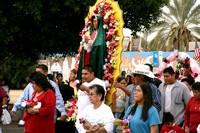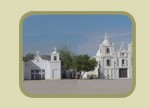History & Traditions

Guadalupe History
Although Guadalupe did not incorporate until 1975, its history dates back to 1907. Guadalupe is home to three cultures – with one of those cultures being the Pascua Yaqui Indians. The Pascua Yaqui Indians have endured many turbulent times beginning with wars fought against the Spanish and Mexicans. The Yaquis were trying to protect the land that they lived on near the Yaqui River in Sonora, Mexico. When Porforio Diaz defeated them, the Yaquis were sent down to the jungles of Yucatan. But during the Mexican Revolution, the Yaquis joined up with Pancho Villa. When Villa's army was defeated, the Yaquis headed to the United States for safety. Many of the Yaquis came up to the Salt River Valley to work on the construction of canals in the area. A community sprung up here – where we became Guadalupe.
Over the years, many Hispanic families have also located in Guadalupe, and it has become a stopping point for Mexican immigrant workers. When the Yaqui people fled to Arizona, Anglos here were sympathetic to their plight as refugees and Yaquis were able to find a home in the Salt River Valley's agricultural economy. Catholic and Presbyterian missionaries also supported the community and helped secure land for a legal Town site in 1914. Residents voted to incorporate the Town in 1975. Click here for the Articles of Incorporation.
- Guadalupe's Buried Past
- THE STORY OF GUADALUPE, ARIZONA: THE SURVIVAL AND PRESERVATION OF A YAQUI COMMUNITY by Leah S. Glaser
 Easter Ceremonies & Traditional Dances
Easter Ceremonies & Traditional Dances
The most important occasion for the Yaqui in Guadalupe are the Lent and Easter ceremonies. The Yaquis, called Yoeme, migrated to Guadalupe from Mexico. The deer dances and the pascola dances and other ceremonies had their origins in the early 1600s in Mexico. The community opens some parts of these ceremonies to the public, and all are invited. However, people must observe and respect the Yaquis’ wishes that no photos be taken and that no drawings or recordings be made. There is a town ordinance with fines for such activity.
Dances, instruments, masks and costumes are an important part of Yaqui arts and tradition, and have helped them to maintain a strong sense of identity. These ancient dances and songs have been taught for generations, and are passed down through trained instructors.

